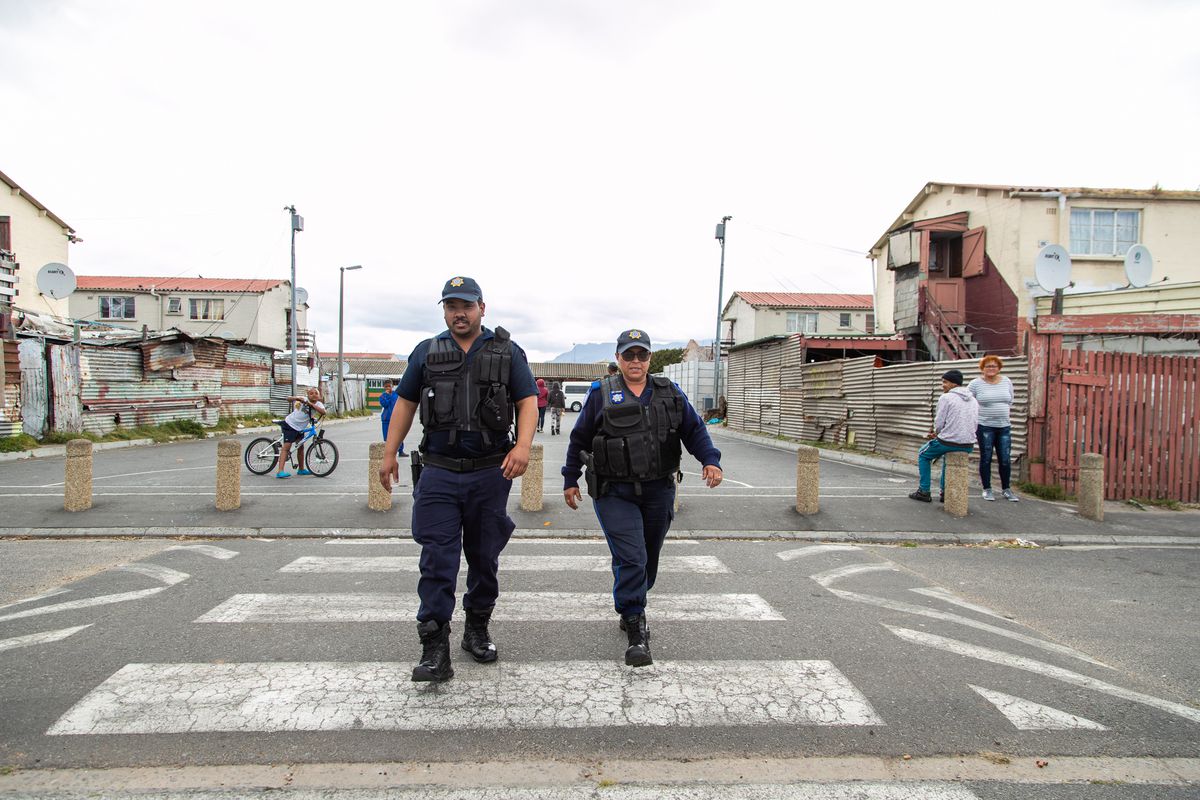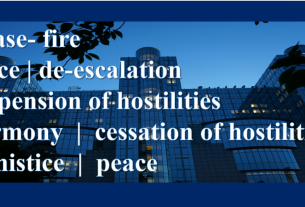LEAP (Law Enforcement Advancement Plan) officers Natasha Sheldon, right, and Ebrahim Price on patrol in Hanover Park, South Africa, on Oct. 13.Sheldon Moultrie/The Globe and Mail
In the suburbs of Cape Town, near the spot where an anti-gang police commander was riddled with bullets by a gunman outside his own home, a fortress-like building now looms above the Bishop Lavis neighbourhood.
The intimidating metal-barred building is the tightly guarded headquarters of Cape Town’s latest police unit – a new security experiment in the city’s most dangerous and crime-ridden suburbs.
Fed up with decades of failures by the national government, Cape Town is pushing for greater local control of policing, energy and transport. The city has hired more than 1,200 of its own law-enforcement officers to patrol the streets. It has begun generating and buying its own electricity, trimming its reliance on the increasingly dysfunctional state power supplier.
The campaign for decentralization could shape South Africa’s future. It offers an escape route from the dominance of the African National Congress, the corruption-plagued party that has ruled the national government since the end of apartheid in 1994. Other cities, such as Johannesburg, are studying the Cape Town model and planning their own electricity systems.
Cape Town and its close ally, Western Cape province, are governed by the ANC’s fierce rival, the Democratic Alliance (DA), which has begun winning elections in some of South Africa’s biggest cities. They call their strategy “devolution.”
:format(jpeg)/cloudfront-us-east-1.images.arcpublishing.com/tgam/SXS5S6OKZRCLRPFRQ6XJNT7KRA.jpg)
LEAP officers congregate outside their new base in Bishop Lavis.Sheldon Moultrie/The Globe and Mail
By disentangling itself from the national government, Cape Town has managed to avoid the worst of the electricity shortages that have heavily damaged the national economy. Murder rates have fallen in most neighbourhoods where the new law-enforcement units are deployed. Rail services work better in Cape Town than in most other South African cities.
But devolution brings dangers too. It could heighten the inequalities within South Africa, accelerating the flow of investment to affluent areas. It could weaken the bonds that unite the country, allowing wealthier residents to retreat into their own enclaves while poorer regions stagnate with fewer resources.
Already there are signs that internal migrants and property investors are flocking to the Cape in disproportionate numbers. One key question is whether this momentum could lead toward full secession.
A few months ago, many people in Cape Town were surprised to learn that the DA had established a Western Cape Devolution Working Group whose members included several separatist groups that support the Cape’s outright independence. “The notion of Fortress Cape Town is a real risk,” said Lorenzo Davids, a social justice activist in the city who supports devolution for the Cape but worries about some of the implications.
“You can design devolution so that it naturally leads to secession, and that’s a big risk,” he said. “It becomes more and more tempting. One province has the resources and private capital for devolution, but other provinces don’t have access to that equity and capital.”
:format(jpeg)/cloudfront-us-east-1.images.arcpublishing.com/tgam/6POBTGXMHVFR3BKJNRKRXVMCIM.jpg)
LEAP base in Hanover Park.Sheldon Moultrie/The Globe and Mail
Cape Town’s mayor, Geordin Hill-Lewis, acknowledges that devolution could have a “short term effect” of widening the economic gaps among South Africa’s cities and regions. But in the longer term, he argues, it could strengthen the country by inspiring local solutions.
“This is not a project in secessionism,” he said in an interview with The Globe and Mail.
“This is our country, this is our home, and I don’t want to break it apart. It’s important for the rest of the country to see that South Africa isn’t done yet, and we’ve got a future ahead of us …. and that this pervasive sense of slow deterioration that one sees and feels in the country is reversible.”
While policing is a national responsibility under the constitution, analysts say the South African police force is badly weakened by corruption, eroding budgets and mismanagement. The country’s murder rate has sharply increased over the past decade. Cape Town is responding by pushing for as much policing power as it can get.
It has introduced high-tech policing techniques such as a gunshot-sensor system, drone surveillance, camera networks and automated licence-plate scanning. And now it supplements the national police by hiring its own law-enforcement officers under a program known as LEAP (Law Enforcement Advancement Plan), whose $80-million annual cost is partly funded by Western Cape.
LEAP officers lack the full investigative powers of national police, but they can carry weapons and detain suspects. They have been assigned to 13 of the city’s murder hot spots – including Bishop Lavis, the neighbourhood where the anti-gang police commander Lieutenant-Colonel Charl Kinnear was gunned down in 2020.
:format(jpeg)/cloudfront-us-east-1.images.arcpublishing.com/tgam/B3OW23ABXNGZ3KSUBJ43QFB4HA.jpg)
A firearm being commissioned at the weapons depot counter at the LEAP base in Bishop Lavis.Sheldon Moultrie/The Globe and Mail
Visits to LEAP bases make it clear that the officers are keenly alert to the threat from the street gangs, whose leaders have exploited South Africa’s high unemployment and poverty rates to recruit jobless youths.
Two blocks from a LEAP base in the Hanover Park neighbourhood, an officer waves at a garbage-strewn street. “This is the Americans’ territory,” he says, referring to one of the most notorious of the gangs.
“And over here on the other side of the road is the Mongrels, and sometimes they go across the road and pop,” he says, slamming his fist into the palm of his hand to simulate a shooting. (The Globe is not identifying him because he was not authorized to speak to the media.)
The LEAP strategy is to locate its stations in the middle of each neighbourhood, patrol constantly and build relations with the community. There is some evidence of progress – including the seizure of more than 230 firearms so far.
:format(jpeg)/cloudfront-us-east-1.images.arcpublishing.com/tgam/QAGEP4C3RJCADNDP6LJFQPLJZU.jpg)
LEAP officer Ebrahim Price.Sheldon Moultrie/The Globe and Mail
“We’re constantly moving around the whole area, to have visibility and prevent crime,” said Ebrahim Price, a 25-year-old LEAP officer in Hanover Park.
He has seized several guns in the neighbourhood, including homemade “zip guns” that are difficult to detect. One such gun was disguised as a bicycle pump.
“Hanover Park is known as an area with a lot of shootings, a lot of crossfire injuries and even killings of innocent people, so to take a firearm off the street is the biggest achievement we can do,” he told The Globe.
His colleague, Natasha Sheldon, says they try to respond swiftly to every tip. “We’ve built a relationship and trust with a lot of people, and they come to us with tip-offs,” she said. “They even stop us in the street.”
:format(jpeg)/cloudfront-us-east-1.images.arcpublishing.com/tgam/ZZNSPXOPLFAS3JD3M7SGYEWY4A.jpg)
LEAP officer Natasha Sheldon in Hanover Park.Sheldon Moultrie/The Globe and Mail
South Africa’s police minister, Bheki Cele, has complained loudly that the LEAP program is a violation of the constitution. He accuses Cape Town and Western Cape of blatantly grabbing power from the national government – and some constitutional experts say he is legally right.
Because of the constitutional dispute, it is unclear whether LEAP officers can exercise the same investigative powers as the national police. But the city is pushing the limits. “We are actively testing the scope of what we can do,” Mr. Hill-Lewis said.
Western Cape’s provincial premier, Alan Winde, says the national police are overloaded with an average of 200 cases per investigator, compared with a global standard of 10 to 20 each. The result, he says, is a low conviction rate.
The national government could easily pass a law to allow LEAP officers to do investigations, Mr. Winde said. “Bheki Cele finds every excuse in the book to tell us that’s not possible,” he said.
“There might be opposition to our safety plan from Bheki Cele, but every time I meet the station commanders and the police on the ground, they say, ‘When can we have more officers?’ ”
:format(jpeg)/cloudfront-us-east-1.images.arcpublishing.com/tgam/O2RKUZOJG5HADFMD4OFFHUHDEU.jpg)
Ms. Sheldon and Mr. Price talk with young community members at Hanover Park.Sheldon Moultrie/The Globe and Mail
Some devolution policies are less controversial. The national government has agreed in principle, for example, to transfer the responsibility for Cape Town’s passenger rail services to a new entity with provincial and municipal shareholding by a target date of 2026.
In practice, however, rail devolution has been slow. The national government has simply stopped replying to Cape Town’s letters on the issue, Mr. Hill-Lewis said.
The biggest test of devolution is the electricity issue. South Africans this year have suffered as much as 10 hours of power blackouts daily. The rationing, known euphemistically as “loadshedding,” is imposed in escalating stages that climbed as high as Stage 6 this year.
To fight this threat, Cape Town maintains a hydropower project in the mountains east of the city, protecting its residents from up to two stages of power cuts. This has shielded Capetonians from almost 60 per cent of the blackouts that the rest of the country has endured.
Within the next four years, the city could protect itself from most loadshedding, Mr. Hill-Lewis said. “It would be a massive boom for the Cape Town economy. We’re pursuing it obsessively.”
As a first step, Cape Town plans to buy hundreds of megawatts of renewable electricity from private producers, while allowing businesses with excess solar energy to sell their surplus to the city.
This could again put Cape Town in conflict with the national government, which restricts independent producers and requires buyers to obtain its permission before any deals. But the devolution campaigners are confident they will win.
“If national wants to stop Cape Town, they’ll have to take them to court and tell them, ‘You can’t have so much electricity,’ ” Mr. Winde said.
“It’d be interesting to see what the court says about that while there’s loadshedding going on. The court will probably be dark, with no lights, and it will definitely rule against the national.”



